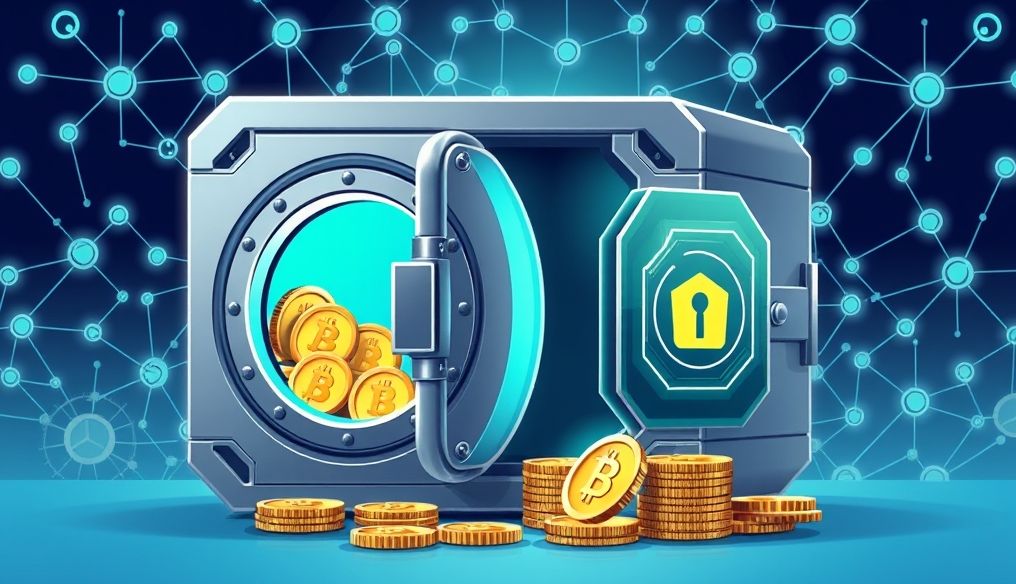Introduction: The Importance of Securing Cryptocurrencies
With the widespread adoption of cryptocurrencies like Bitcoin and Ethereum, securing these digital assets has become paramount. Many investors have suffered significant losses due to hacks and thefts, highlighting the urgent need for secure storage solutions. This article explores in detail hardware wallets and cold storage as best practices for protecting your cryptocurrency investments.
Chapter 1: What are Cryptocurrencies and Why Do They Need Securing?
Cryptocurrencies are digital assets that use cryptography to secure transactions and control the creation of new units. The most famous is Bitcoin, but there are thousands of other cryptocurrencies. Their value is volatile and depends on supply and demand, making them attractive to investors but also vulnerable to risks.
Reasons for Needing to Secure Cryptocurrencies:
- Theft and Hacking: Trading platforms and online wallets are susceptible to hacking.
- Loss of Private Keys: Losing private keys means permanently losing access to cryptocurrencies.
- Fraud: Many fraudulent projects target new investors in the cryptocurrency space.
Chapter 2: Understanding Cryptocurrency Wallets
A cryptocurrency wallet is a software program or device that stores the private keys that allow you to access and spend your cryptocurrencies. There are different types of wallets:
- Software Wallets: Applications on a computer or smartphone. Easy to use but less secure.
- Web Wallets: Wallets available online. Convenient but the most vulnerable to hacking.
- Hardware Wallets: Physical devices that securely store private keys.
- Paper Wallets: Paper printed with private and public keys.
Comparison of Wallet Types:
| Wallet Type | Security | Convenience | Cost |
|---|---|---|---|
| Software Wallets | Medium | High | Free |
| Web Wallets | Low | High | Free |
| Hardware Wallets | High | Medium | High |
| Paper Wallets | High (if stored securely) | Low | Free |
Chapter 3: What are Hardware Wallets and How Do They Work?
Hardware wallets are physical devices specifically designed to securely store private keys for cryptocurrencies. These devices work by keeping the private keys in an environment completely isolated from the internet, making them resistant to hacking and malware.
How Hardware Wallets Work:
- Private keys are generated inside the device and never leave the device.
- Transactions are signed inside the device, preventing malware from manipulating transactions.
- Most hardware wallets require a PIN or password to access them.
Chapter 4: Benefits of Using Hardware Wallets
Hardware wallets offer several benefits compared to other types of wallets:
- Superior Security: Private keys are protected in an isolated environment.
- Resistance to Hacking: Even if your computer is infected with malware, your cryptocurrencies remain safe.
- Ease of Use: Although more secure, hardware wallets are relatively easy to use.
- Support for Many Cryptocurrencies: Most hardware wallets support a wide range of cryptocurrencies.
Chapter 5: Popular Hardware Wallets on the Market
There are many hardware wallets available on the market, each with its own features. Some of the most popular include:
- Ledger Nano S/X: One of the most popular wallets, supports many cryptocurrencies and features an easy-to-use interface.
- Trezor Model T: Another popular wallet with a touchscreen and support for many cryptocurrencies.
- KeepKey: A wallet featuring a large screen and sleek design.
Chapter 6: What is Cold Storage and How Does It Differ from Hot Storage?
Cold storage is a method of storing cryptocurrencies offline. This significantly reduces the risk of theft and hacking. Unlike hot storage, which refers to storing cryptocurrencies on trading platforms or online wallets, cold storage provides an extra layer of security.
Difference Between Cold Storage and Hot Storage:
| Feature | Cold Storage | Hot Storage |
|---|---|---|
| Internet Connection | Offline | Online |
| Security | High | Low |
| Convenience | Low | High |
| Cost | Low | Low |
Chapter 7: Advantages and Disadvantages of Cold Storage
Cold storage has advantages and disadvantages to consider:
Advantages:
- Superior Security: Protection from hacking and theft.
- Full Control: You have complete control over your private keys.
Disadvantages:
- Low Convenience: Accessing your cryptocurrencies takes longer.
- Responsibility: You are responsible for protecting your private keys.
Chapter 8: How to Implement Cold Storage Correctly
To implement cold storage correctly, the following steps must be followed:
- Create an Offline Wallet: Using wallet software or a paper wallet.
- Store Private Keys Securely: In a safe place protected from theft and damage.
- Use a Backup: To ensure recovery of your cryptocurrencies in case of loss of private keys.
Chapter 9: Additional Tips for Securing Your Cryptocurrencies
In addition to using hardware wallets and cold storage, there are some additional tips that can help secure your cryptocurrencies:
- Use Strong and Unique Passwords: And change them regularly.
- Enable Two-Factor Authentication: On all your cryptocurrency-related accounts.
- Beware of Phishing Emails: And do not click on suspicious links.
- Update Antivirus Software: Regularly.
- Keep a Backup of Your Wallet: In a safe place.
Chapter 10: Conclusion: The Future of Cryptocurrency Security
As cryptocurrencies become more popular, their security will continue to evolve. Hardware wallets and cold storage are currently the best practices for protecting your investments, but it is important to stay up-to-date on the latest threats and security solutions. By taking the necessary precautions, you can enjoy the benefits of cryptocurrencies without risking losing your funds.
Disclaimer: This article is for educational purposes only and does not constitute financial advice. You should always conduct your own research before making any investment decisions.




